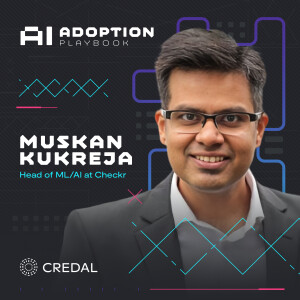AI Adoption Playbook
Welcome to The AI Adoption Playbook—where we explore real-world AI implementations at leading enterprises. Join host Ravin Thambapillai, CEO of Credal.ai, as he unpacks the technical challenges, architectural decisions, and deployment strategies shaping successful AI adoption. Each episode dives deep into concrete use cases with the engineers and ML platform teams making enterprise AI work at scale. Whether you’re building internal AI tools or leading GenAI initiatives, you’ll find actionable insights for moving from proof-of-concept to production.
Episodes

Tuesday Jan 21, 2025
Tuesday Jan 21, 2025
What happens when you enable SQL engineers to build sophisticated AI systems with just 26 lines of code? At Ramp, it sparked a transformation in how they approach AI implementation: instead of relying on ML specialists, they're democratizing AI development across their organization.
But that's just one part of Ramp's unconventional story. As Head of Analytics Engineering & Data Science, Ian Macomber explains how processing financial data for 30,000 companies led them to reimagine enterprise AI architecture. By building model-agnostic systems that can switch seamlessly between foundation models, they're creating sustainable competitive advantages while maintaining cost efficiency.
In this episode of The AI Adoption Playbook, Ravin sits down with Ian to unpack how Ramp evolved from basic receipt matching to sophisticated cross-functional AI systems that are reshaping enterprise financial operations.
Topics discussed:
How Ramp's decentralized approach to AI procurement enabled rapid experimentation while maintaining standards and leading to the discovery that most point-solution AI tools show surprisingly weak retention rates.
Their data architecture strategy: managing complex databases with 133,000 columns by implementing semantic layers and guardrails that make enterprise-scale text-to-SQL accessible to non-specialists.
The small team philosophy they implemented: breaking larger teams into units of 12 or fewer people, fostering rapid iteration while maintaining the velocity of a startup despite growing to over 1,000 employees.
Their approach to foundation model selection: treating AI providers like ride-sharing services, constantly evaluating performance and cost metrics to switch between models based on specific use cases.
Their strategy for building defensible AI products: focus on sophisticated integrations that combine organizational data, spending policies, and real-time market information in ways that point solutions can't replicate.
Listen to more episodes:
Apple
Spotify
YouTube
Website
Episode 2.

Tuesday Jan 07, 2025
Tuesday Jan 07, 2025
What happens when you pause all company operations for a week to teach everyone — from marketers to legal teams — how to build AI co-pilots? At Checkr, it sparked an innovation wave from an unexpected source: their non-technical teams started outpacing engineers in creating practical AI solutions.
But that's just one part of Checkr's unconventional story. As Head of ML/AI, Muskan Kukreja explains how the rise of the gig economy forced them to reimagine background checks for a world where workers change jobs daily. By using AI to drive costs down to $1 per check, they're expanding trust-building tools beyond enterprise clients to serve entirely new markets.
In our first episode of The AI Adoption Playbook, Ravin Thambapillai, CEO of Credal.AI sits down with Muskan to unpack how Checkr is using AI to transform background checks from a weeks-long process into a same-day service.
How Checkr's week-long company-wide AI hackathon yielded an unexpected outcome: non-technical teams (legal, marketing) outpaced engineers in creating practical AI solutions by focusing on their daily pain points rather than technical capabilities
Their data processing architecture: handling billions of searches across thousands of data sources by implementing AI-powered verification workflows with human-in-the-loop fallbacks for edge cases
The "T-shaped team" structure they implemented: instead of hiring separate specialists (data scientists, ML engineers, AI researchers), they built teams with broad skills across disciplines who deeply understood business problems
Their approach to high-stakes AI applications: enforcing a strict checklist process that includes PII masking, data retention policies, and mandatory security/legal/ethics reviews for any customer-facing AI feature
Their 90-day shipping philosophy: breaking down large AI initiatives into quarter-sized chunks with clear KPIs, allowing rapid iteration while maintaining compliance with emerging AI regulations
Learn more about Checkr's approach to AI implementation on their engineering blog or read about their compliance framework in their trust center.


